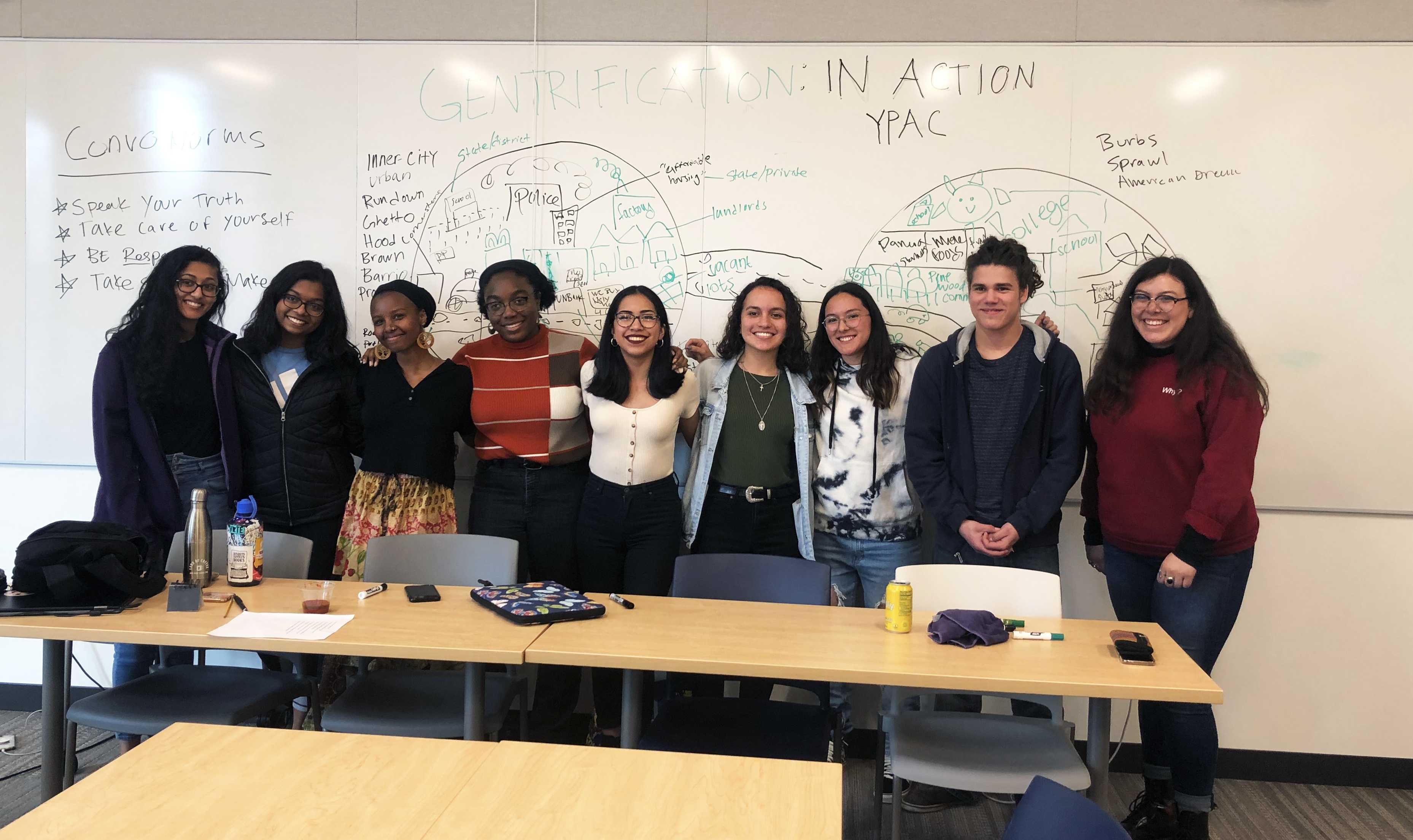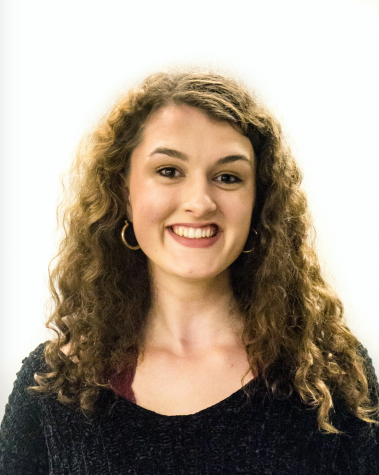Eleven or so Macalester students gathered in a classroom in the Theatre and Dance Building on the afternoon of Thursday, April 18 for a youth-led discussion on gentrification in the Twin Cities. The Young People’s Action Coalition (YPAC), a youth political organizing group in Minneapolis and St. Paul, hosted the talk.
The event was inspired by a panel sponsored by the urban studies colloquium last December that centered around Allianz Field in the Hamline-Midway neighborhood.

At that panel, a member of the Allianz Field development team as well as local community advocates spoke about the stadium’s benefits for the community. Members of YPAC were present at the original event and challenged the developer’s sentiments about its benefits, pointing out its inevitable gentrification.
Gabi Estrada ’21 works as a facilitator for YPAC, and was also present at the December event.
“[The developers] first talked about the general plans of the stadium, and why they chose the neighborhood, because of its like vibrant, cultural neighborhoodness and what not,” Estrada said. “I invited my YPAC students there because some of them live in the Hamline-Midway neighborhood where the stadium was built, and they had previously expressed hate for it.
Estrada appreciated the YPAC students’ ability to bring a critical lens to the panel.
“Some of my students are at risk of being displaced because of it,” Estrada continued. “They really challenged all of the people who were on the panel there, asking them questions about what they were going to do about increased police brutality that will happen because of increased police presence, and sex trafficking, and displacement of local businesses and families and all of this stuff. Basically, they hadn’t thought of any of that.”
After the panel ended, the urban studies concentrators who were present thanked the YPAC students for asking the panelists such important questions about the Field’s gentrifying effects.
“[They] reached out to [YPAC] first and asked us to do something in response to that panel, so that was the first step to getting us at Macalester,” Estrada said. “I’m very glad that they were able to do it.”
The facilitated discussion on Thursday started with some general mingling of Macalester students and YPAC members, and then the YPAC students introduced themselves and described norms for their conversation.
“Some of the things we talk about might make you feel uncomfortable, and that’s kind of the point — that is the point of discourse,” YPAC member Miski Omar of Hamline-Midway said. “Feel free to just say what you have to, even if you feel like it might make you uncomfortable. That’s the whole point, to deconstruct these ideas that we have and that make us uncomfortable.”
“Especially if you’ve never had a conversation surrounding topics like these,” YPAC member Britney Chino of Eagan said. “It’s highly encouraged for you to actually join into the conversation.”
The YPAC members started the discussion with a quick drawing activity where they drew a stereotypical inner-city neighborhood as well as suburb using whiteboard markers. The YPAC members asked the audience for suggestions. People in the audience said there were amenities such as well-maintained public schools, parks and wide sidewalks in the suburbs, and in the inner city there were poorly-maintained roads, fast-food restaurants and a heavy law enforcement presence.
“The same systems that are running things over here,” Omar said, pointing to the downtown, inner city area, “are running things over here,” pointing to the suburb she had drawn.
“But why is there such a difference between the two?” she asked.
Next, the YPAC members encouraged all of the participants to discuss gentrification in small groups.
“I’ve seen it in the city that I’m from, Washington D.C., which is one of the fastest gentrifying cities,” Will Hamlin ’21 said. “I spent most of my life in the rich, white neighborhoods, but as I got older and I went out into the city more and went around I was like, ‘Oh, wow. Things are actually changing.’ It’s very visible.”
Some students noted the powerful gentrification effects of building new city attractions, such as sports stadiums.
“A lot of us in my group grew up [in] or are familiar with the D.C. area,” Kat Lewis ’21 said. “So we shared a lot about the gentrification that happens there, also in the area with the [Washington Nationals] stadium. It’s a very dramatic shift in the development and the changing in the neighborhood, so it’s kind of similar to the soccer stadium.”
After students shared tidbits from their conversations, the YPAC facilitators explained that once these attractions are built, wealthy, privileged people start to move into the neighborhoods for the “cultural diversity and vibrance.”
“We said that the first step of gentrification was the desire to be in those areas,” Chino said. “It’s now fashionable to be poor, for some reason, and it has everything to do with oppression Olympics, right?”
Chino noted that these sentiments often stem from selfish desire to not feel a sense of privilege.
“This whole systematic idea, that if you are in a place where you are not as privileged, you feel like you can be more humble, you don’t have the need to feel sorry for someone,” she continued “You move to these areas because have a desire to be in that position.”
The event ended with key takeaways from the facilitators, including Estrada.
“Do research on what businesses to support, what businesses to stay away from, tell your friends about some knowledge that you received today,” Estrada said.
After the event, Estrada said they thought there were advantages to having youth from the community lead the event, especially youth who are interested in radical political organizing.
“It’s especially important for Macalester College students to see how radical high school students can be, so there is no excuse for college students to not radicalize because, I mean, they have all the resources and capacity,” they said. “Also, as college students, we will be the next yuppies going off and finding new jobs and housing, so I think it’s really important to know about all of these things now.”
Charlie Gorham ’21 attended the event, and she hopes to see more discussions surrounding gentrification in the future, as well as discussions led by non-Macalester community residents.
“I think Macalester can learn a lot more from community members. I would love to see more youth led — high school-led community meetings, or just meetings with contributing community members.
“It’s hard because students with student loans don’t have a lot of money and also don’t have well-paying jobs yet, so they have to move somewhere that is affordable,” Gorham said. “But they should be careful not to move into a hip place that is attractive because it’s diverse, and it has authentic hole-in-the-wall restaurants… then once the Whole Foods comes in, you think ‘Oh, I actually like this better than the local grocery store that didn’t have, you know, quail eggs, and then there you go. You have gentrification.”
For Estrada, working with YPAC has been a way to engage with the community’s youth to achieve social change. They think that Macalester could learn something from YPAC’s radical, direct action method of fighting for change.
“It’s been really great,” Estrada said. “It’s so refreshing being around radical people, especially when they are youth, especially being at Macalester all of the time, where everything’s like pretty neutral, kind of neoliberal — like white liberal, not super radical.
“It’s just been super fulfilling work that I have loved to do,” they continued. “I just love getting to know them and helping them develop their passions, and just learning about them and the community.”





Heather May • Sep 10, 2019 at 11:35 am
Thanks for your publication. I also think laptop computers have gotten more and more popular nowadays, and now in many cases are the only form of computer utilised in a household. This is due to the fact that at the same time potentially they are becoming more and more affordable, their computing power keeps growing to the point where these are as powerful as desktop computers through just a few in years past.
Donna Tucker • Sep 6, 2019 at 3:50 am
you’ve a terrific weblog right here! would you prefer to make some invite posts on my weblog?
Emory Austine • Jul 23, 2019 at 10:34 am
Mass parsite http://bit.ly/2W9CVkn